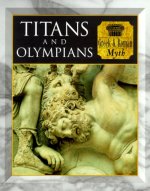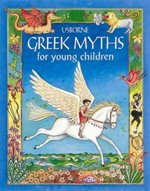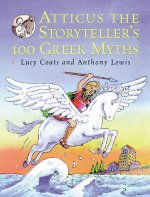Menu
Install the app
How to install the app on iOS
Follow along with the video below to see how to install our site as a web app on your home screen.
Note: This feature may not be available in some browsers.
You are using an out of date browser. It may not display this or other websites correctly.
You should upgrade or use an alternative browser.
You should upgrade or use an alternative browser.
Greek Mythology Community
What are the best Greek mythology books for teens?
- Thread starter nadellii
- Start date
1 - 6 of 6 Posts
J
John Stefan
Guest
Yes I do. Below are 3 good Greek Mythology Books to recommend for teenagers.
1 - Atticus The Storyteller 100 Greek Myths
2 - Usborne Greek Myths for Young Children
3 - Titans and Olympians Greek and Roman Mythology Myth and Mankind
I hope this helps as they are all very good books in my opinion so any or all of them will do.
kind regards John Stefan
1 - Atticus The Storyteller 100 Greek Myths
2 - Usborne Greek Myths for Young Children
3 - Titans and Olympians Greek and Roman Mythology Myth and Mankind
I hope this helps as they are all very good books in my opinion so any or all of them will do.
kind regards John Stefan
kosta_karapinotis
Active member
I love the Percy Jackson series! It's inspired by Greek mythology, not actual Greek mythology
J
John Stefan
Guest
knicks_fan87
Active member
I used to have Greek Myths for Young Children! You're bringing back so many memoriesBelow are the pictures of the 3 books that I recommended
kind regards John Stefan
k_tsoukalas
Administrator
I read the Edith Hamilton one when I was in middle school. I think I was a bit too young, but high school age might be about right for that one.

 en.wikipedia.org
en.wikipedia.org

Mythology (book) - Wikipedia
1 - 6 of 6 Posts
JOIN THE DISCUSSION AND READ OTHER GREEK INFO:
Afterlife Beliefs in Greek Mythology?
- toniiv
- Greek Mythology Forum
- Replies: 1
What did Ancient Greeks believe about the afterlife? I've heard a few different stories... I'm particularly drawn to Ancient Greece's take on life after death.
Was there a uniform belief system, or did it vary significantly among different cities or periods? How did their beliefs influence their daily life and practices? I'm also curious about the role of mythological figures like Hades and the concept of Elysium.
If anyone has any expertise, recommended readings, or can point me to resources where I might be able to gather detailed insights into these spiritual aspects of Ancient Greek culture, I would greatly appreciate it.
Was there a uniform belief system, or did it vary significantly among different cities or periods? How did their beliefs influence their daily life and practices? I'm also curious about the role of mythological figures like Hades and the concept of Elysium.
If anyone has any expertise, recommended readings, or can point me to resources where I might be able to gather detailed insights into these spiritual aspects of Ancient Greek culture, I would greatly appreciate it.
Summary of the Nine Muses of Greek Mythology
- d_kakavouli
- Greek Mythology Forum
- Replies: 1
I've been studying about Greek Mythology and I bumped into some information about the 9 muses. I thought I would give a summary of who they are and what they represented. I feel like the Muses are often forgotten!
In Greek mythology, the Muses were goddesses who presided over the arts and sciences, inspiring creativity and knowledge in humans. There were originally nine Muses, each with her own domain of expertise. Here's a summary of who they were:

In Greek mythology, the Muses were goddesses who presided over the arts and sciences, inspiring creativity and knowledge in humans. There were originally nine Muses, each with her own domain of expertise. Here's a summary of who they were:
- Calliope: The Muse of epic poetry and eloquence. She was often depicted with a writing tablet or a scroll.
- Clio: The Muse of history. She was often depicted holding a scroll or a set of tablets, symbolizing the recording of historical events.
- Euterpe: The Muse of music, song, and lyric poetry. She was often depicted holding a flute or a double flute.
- Thalia: The Muse of comedy and bucolic poetry. She was often depicted with a comic mask, a shepherd's crook, or a wreath of ivy.
- Melpomene: The Muse of tragedy. She was often depicted holding a tragic mask and a sword or club.
- Terpsichore: The Muse of dance and choral poetry. She was often depicted holding a lyre and dancing.
- Erato: The Muse of love poetry and lyric poetry. She was often depicted holding a lyre and a wreath of roses.
- Polyhymnia: The Muse of sacred poetry, hymns, and eloquence. She was often depicted in a pensive or meditative pose, sometimes holding a finger to her lips.
- Urania: The Muse of astronomy and astrology. She was often depicted holding a globe and a compass, symbolizing the study of celestial bodies and their movements.

Question about the Fates of Greek Mythology
- d_kakavouli
- Greek Mythology Forum
- Replies: 0
I am helping someone gather information for a school project on Greek Mythology so your input is much appreciated. This is more like, to help the person know enough information to be able to research it.
The project is about the Fates. These mysterious beings, often depicted as three sisters—Clotho, Lachesis, and Atropos—were believed to control the destiny of every mortal and god alike. Their thread-spinning, measuring, and cutting symbolized the weaving of each individual's life, from birth to death.
But what exactly was the extent of their power? How did they interact with other gods and mortals? These questions have sparked endless fascination and speculation among scholars and enthusiasts alike.
Were the Fates merely impartial observers, executing predetermined destinies without interference? Or did they possess agency, actively shaping the lives of those they governed? Furthermore, what implications did their existence hold for concepts of free will and determinism in ancient Greek thought?
The project is about the Fates. These mysterious beings, often depicted as three sisters—Clotho, Lachesis, and Atropos—were believed to control the destiny of every mortal and god alike. Their thread-spinning, measuring, and cutting symbolized the weaving of each individual's life, from birth to death.
But what exactly was the extent of their power? How did they interact with other gods and mortals? These questions have sparked endless fascination and speculation among scholars and enthusiasts alike.
Were the Fates merely impartial observers, executing predetermined destinies without interference? Or did they possess agency, actively shaping the lives of those they governed? Furthermore, what implications did their existence hold for concepts of free will and determinism in ancient Greek thought?
Mythological Roots of the Olympic Games
- dimi_pat
- Greek Mythology Forum
- Replies: 1
I've recently found myself deeply fascinated with how ancient myths and legends have influenced modern traditions and events, particularly those with a global following. Among these, the Olympic Games stand out as a prime example of ancient traditions influencing contemporary world culture. I'm eager to learn more about the mythological roots of the Olympic Games and thought this would be the perfect community to turn to for insights.
From what I understand, the origins of the Olympics are deeply intertwined with Greek mythology. The games were held in Olympia, a sanctuary site for Greek gods, and featured various competitions and rituals dedicated to Zeus, the sky and thunder god in ancient Greek religion. However, my knowledge of how these mythological aspects directly influenced the establishment and evolution of the Olympic Games feels quite superficial.
From what I understand, the origins of the Olympics are deeply intertwined with Greek mythology. The games were held in Olympia, a sanctuary site for Greek gods, and featured various competitions and rituals dedicated to Zeus, the sky and thunder god in ancient Greek religion. However, my knowledge of how these mythological aspects directly influenced the establishment and evolution of the Olympic Games feels quite superficial.
Are there influences of Greek mythology in our modern culture?
- ssherie_
- Greek Mythology Forum
- Replies: 0
I've been deeply fascinated by Greek mythology for as long as I can remember—its epic tales, deities, and heroes that have influenced countless aspects of Western culture. Recently, I've started to ponder more deeply about its presence and influence in our contemporary life and culture. From literature and movies to expressions and brands, it seems Greek mythology has woven itself into the very fabric of our daily experiences.
I'm curious to hear your thoughts and observations on this topic. Have you noticed any interesting or surprising ways Greek mythology manifests in today's society? Perhaps in ways we might not even immediately recognize due to how integrated they are?
I'm curious to hear your thoughts and observations on this topic. Have you noticed any interesting or surprising ways Greek mythology manifests in today's society? Perhaps in ways we might not even immediately recognize due to how integrated they are?
Share and discuss Greek mythology!
WorldwideGreeks.com is a free online forum community where people can discuss Greek food, travel, traditions, history and mythology.
Join Worldwide Greeks here!
Join Worldwide Greeks here!
JOIN COMMUNITY FOR FREE
LOGIN TO YOUR ACCOUNT





